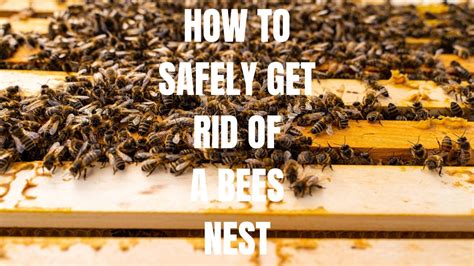How To Eliminate Bee Nest
Ronan Farrow
Mar 24, 2025 · 3 min read

Table of Contents
How to Eliminate a Bee Nest Safely and Effectively
Bees are essential pollinators, playing a vital role in our ecosystem. However, a bee nest near your home can pose a safety risk, especially if you or someone in your household has allergies. Eliminating a bee nest requires caution and the right approach. This guide will walk you through the process, emphasizing safety and responsible bee removal.
Identify the Type of Bee
Before attempting any bee nest removal, correctly identifying the type of bee is crucial. Different bee species have different behaviors and require different removal methods. Honeybees, bumblebees, and wasps all build nests, but their nests vary significantly, as do their levels of aggression. A misidentification can lead to ineffective removal or even dangerous situations.
Honeybees: These bees are generally docile unless provoked and live in large colonies within hives. Their nests are often found in wall cavities, attics, or tree hollows.
Bumblebees: These bees are fuzzy and larger than honeybees. They typically nest in the ground, in cavities, or even in birdhouses. Bumblebees are generally less aggressive than honeybees.
Wasps: These stinging insects are known for their aggressive behavior and build nests that are papery in appearance. They can build nests in various locations, including trees, bushes, under eaves, and inside walls.
Assess the Risk
Once you've identified the type of bee, carefully assess the risk. Consider the size of the nest, the location of the nest, and the proximity to human activity. A large nest in a high-traffic area presents a greater risk than a small nest hidden away in an inaccessible location. If you are unsure or uncomfortable with any aspect of the process, contact a professional pest control service. They have the expertise and equipment to safely remove bee nests.
Methods for Bee Nest Removal
For small, inactive nests (especially in the late fall or winter when bees are less active):
- Protective Gear: Always wear protective clothing, including a bee suit, gloves, and eye protection.
- Removal: Carefully remove the nest using a sturdy bag or container. Dispose of the nest far away from your home.
For active nests:
- Relocation (Highly Recommended): Contact a local beekeeper or pest control service specializing in bee relocation. They can safely remove the nest and relocate the bee colony to a more suitable environment. This is the most humane and environmentally responsible method.
Prevention of Future Bee Nest Building
After eliminating the bee nest, take steps to prevent future infestations. This can involve:
- Sealing Entry Points: Repair any cracks or gaps in your home's exterior that bees might use to enter.
- Removing Attractants: Remove sources of food and water that attract bees, such as overflowing garbage cans or stagnant water.
- Regular Inspections: Periodically inspect your property for any signs of new bee nests.
Important Considerations
- Allergies: If you or someone in your household has severe bee allergies, seek professional help immediately. Do not attempt to remove the nest yourself.
- Legalities: In some areas, the removal of certain types of bees may be regulated. Check your local laws and regulations before taking any action.
- Safety First: Always prioritize your safety. If you are unsure about any aspect of bee nest removal, contact a professional.
By following these guidelines, you can effectively eliminate bee nests while prioritizing safety and environmental responsibility. Remember, professional help is often the safest and most effective approach, especially with large or active nests.
Featured Posts
Also read the following articles
| Article Title | Date |
|---|---|
| How To Get Back A Non Refundable Deposit | Mar 24, 2025 |
| How To Date Old 7up Bottles | Mar 24, 2025 |
| How To Get Rid Potato Bugs | Mar 24, 2025 |
| How To Cook Bear Roast | Mar 24, 2025 |
| How To Destroy Notary Stamp | Mar 24, 2025 |
Latest Posts
-
How Long After Wisdom Teeth Removal Do The Stitches Dissolve
Apr 05, 2025
-
How Long After Wisdom Teeth Removal Can You Drink Soda
Apr 05, 2025
-
How Long After Uscis Actively Review Case
Apr 05, 2025
-
How Long After Tummy Tuck Can I Have Alcohol
Apr 05, 2025
-
How Long After Top Surgery Can I Workout
Apr 05, 2025
Thank you for visiting our website which covers about How To Eliminate Bee Nest . We hope the information provided has been useful to you. Feel free to contact us if you have any questions or need further assistance. See you next time and don't miss to bookmark.
